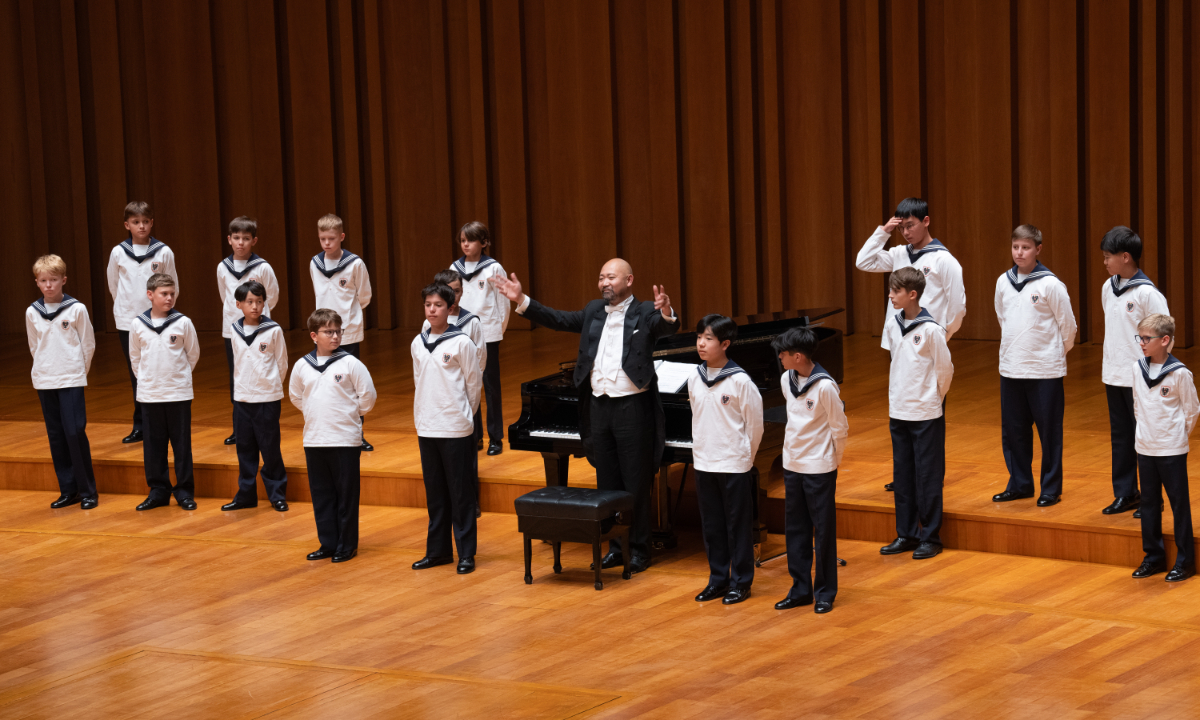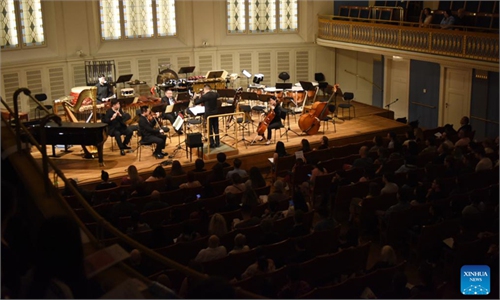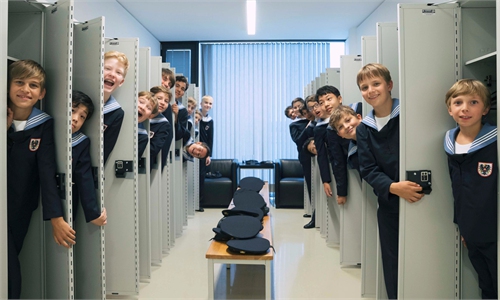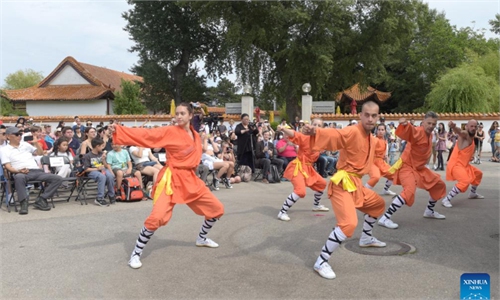IN-DEPTH / IN-DEPTH
From Danube River to Yangtze River: Vienna Boys Choir’s first Chinese conductor shares Chinese culture through music

Jimmy Chiang Chi Bun and the boys from the Vienna Boys Choir’s Haydn Choir salute the audience during a concert in China in October 2024. Photo: Courtesy of Chen Hui
As one of the most prestigious performance groups in the world, the Vienna Boys Choir boasts a history of over 500 years, with performances across the globe. In 2013, the choir welcomed its first Chinese conductor, Jimmy Chiang Chi Bun.
The conductor and pianist from Hong Kong leads the Vienna Boys Choir’s Haydn Choir, striving to bring the beauty of classical music from Europe to Chinese audiences, while also hoping to introduce more international listeners to the charm of Chinese music.
Chiang began his strict musical training at an early age, learning piano at just four years old and making his first stage appearance at five. Although his parents were not professional musicians, their deep passion for music laid a strong foundation for his future career.
Growing up in Hong Kong, Chiang later pursued further studies in Europe and America, studying under several world-renowned music masters, including instructors from the German, Russian, and Austrian schools.
In an interview with the Global Times, he shared that his musical journey blends Eastern and Western elements, making it "richer compared to many others."
Spreading Chinese culture through music
"You come from the snowy mountains, spring tides are your style; you rush toward the East China Sea, roaring waves reflect your spirit..."
During the National Day holidayS, the young singers from Vienna performed Song of the Yangtze River at the National Centre for the Performing Arts, located in the heart of Beijing. Dressed in their iconic sailor uniforms and singing in classical vocals, they amazed the Chinese audience, who responded with thunderous applause.
Before performing this song, the children showcased the delicate Yunnan folk song The Flowing Stream with their gentle voices.
The contrast between subtlety and grandeur complemented each other, deeply moving the audience.
Foreign ensembles touring China often perform Chinese songs outside their standard repertoire, but Chiang, as a conductor from Chinese background, makes more thoughtful selections.
He told the Global Times that he usually chooses Chinese folk songs that carry cultural significance, in line with the theme of the tour. "For instance, for this tour, I thought the theme was 'From the Danube to the Yangtze River,' so I chose ‘Song of the Yangtze River’ as a representative Chinese piece," he explained.
For Chiang, this is not only a cultural bridge between China and Austria, but also a way for foreign audiences to understand Chinese culture through music.
Since leading the Vienna Boys Choir on its first tour of China in 2015, Chiang has incorporated Chinese music into their performances. The Haydn choir, besides singing the internationally famous “Jasmine Flower,” also performed the Cantonese song “Moonlight” and the Hebei folk song “To the Flowers.”
This fusion of Eastern and Western musical traditions delighted audiences. "I was born in Hong Kong, and ‘Moonlight’ was a nursery rhyme from my childhood. My mother taught me this song when I was just one year old," Chiang recalled.
In 2018, Chiang led the choir in recording a performance of “I Love You, China,” which aired on China Central Television. The video went viral, becoming a widely discussed topic. Reflecting on the song, Chiang said it expressed a deep love for China and showcased Chinese music’s influence on the international stage. "Most of our choir members do not speak Chinese, but they truly felt the emotion behind the music," he noted.
‘China’s development impresses me’
In September and October this year, Chiang once again led his choir on a tour of China, their first visit in several years. The tour covered more than a dozen cities, including Beijing, Shanghai, Xi’an, and Guangzhou.
Looking back on a decade of performances across China, Chiang remarked on the noticeable changes in the country each time he returns, particularly in infrastructure and urban landscapes. "From big cities to smaller towns, China’s pace and scale of development are astonishing," he said.
Chiang also observed that Chinese audiences’ appreciation for international art troupes has been growing. "Especially in cities like Beijing and Shanghai, the audience reactions are very enthusiastic," he said.
However, in some smaller cities, audiences are still getting accustomed to choral performances, requiring more time to understand and accept the art form. "This is one of the reasons why cultural exchanges are so important."
He also highlighted the cultural potential of the Guangdong-Hong Kong-Macao Greater Bay Area, noting that this region has vast opportunities for artistic exchange. As an international cultural bridge, Hong Kong can drive cultural cooperation and development across the Greater Bay Area, Chiang said.
"Hong Kong’s rich experience in international musical exchanges provides great conditions for the collaborative growth of this region. By strengthening cooperation, we can further promote traditional music exchange and cultivate a deeper musical appreciation among audiences in the Greater Bay Area," he said.
As the first Chinese conductor of the Vienna Boys Choir, Chiang found one challenge he need to face is upholding the choir’s 500-year tradition while maintaining its high standards.
He noted that conducting a children’s choir is similar to working with adult orchestras in many ways, though children’s shorter attention spans require him to use more concise language and methods. "I’ve learned how to communicate the essence of the music more efficiently, which has also boosted my confidence when rehearsing with adult orchestras," he explained.
Chiang, who excels in both orchestral and operatic fields, shared that Western music education focuses on creativity and expressiveness, while he brings the Asian spirit of "hard work and discipline" to the choir’s training. "Our children come from diverse cultural backgrounds, but I hope they can find resonance in the music. For them, music is not just an art form but also a means of communication and understanding."
He believes that music, as an art form that transcends language, serves as the best cultural bridge.
Chen Hui and Zhang Yunyi contributed to the story




